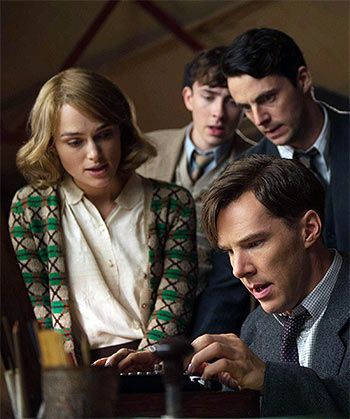 The Imitation Game is an unsubtle film that delivers exactly what you expect in the most predictable way, laments Raja Sen.
The Imitation Game is an unsubtle film that delivers exactly what you expect in the most predictable way, laments Raja Sen.
Remember the first time you heard the last Pink Floyd album?
No, not that recent bit of noodley-guitar nonsense, but The Division Bell, twenty years ago?
I was thirteen and instantly heartbroken, because, despite most of the same band placing most of the same old sounds in the same old places, they didn’t have anything to sing about.
No soul. There was craft, certainly, and David Gilmour can wring poetry out of a fretboard like the best of ‘em, but this was not the Floyd of Barrett or even the Floyd of Waters, this was just a talented set of architects trying very hard to sound like Pink Floyd -- without ever feeling like them.
In other words, an imitation game.
It’s much the same in Morten Tyldum’s new film about British genius Alan Turing.
There is wonderful biopic-meat to be found in the story of a mathematician who succeeded at war against the Nazis, pioneered computers and was eventually -- and tragically -- done in for happening to be a homosexual.
There are some fine actors preening under their respective spotlights, most of all Benedict Cumberbatch who wields that lead guitar like an acoustic boss.
And yet this is a bland, flavourless film, a film that runs smoothly but too predictably, a film that cries its heart out (with much sincerity) but one that never, ever sings.
Which means, naturally, that some people will love The Imitation Game.
It is an unsubtle film that delivers exactly what you expect in the most predictable way, and one which repeats its mantras over and over; one line, “it is the people no one imagines anything of who do the things no one can imagine” is repeated at least four times, clearly marking it as this movie’s great power and great responsibility.
For the undemanding viewer who doesn’t mind spoonfeeding -- in a stiff English accent, no less, with two actors from Downton Abbey just for good measure -- this is a perfectly watchable film, even though every scene predictably ends with Cumberbatch’s Turing getting the last word or having the last laugh.
Fans of The Division Bell, those blokes who sit in bars with frozen playlists and raise their whiskey-sodas to Pinkish Floyd and celebrate a lyric like “the grass is greener” only because they remember the words, may just have a field day.
Despite the wasted potential, The Imitation Game is a competently made film, telling the story of a British hero who envisioned computers many years before anyone else, a man who developed codebreaking machines to interpret Nazi codes during the second World War, and a man convicted of being gay.
Cumberbatch is excellent in the part, though his part is ridiculously straitjacketed by antisocial stereotypes: he comes off like a fey, attractive-version of Sheldon from The Big Bang Theory, a dreamy blue-eyed man who can break the enigma machine but who can’t decipher an invitation to lunch.
It is also exasperating, in a film that pivots around the persecution of a man for his sexuality, to watch Cumberbatch play Turing with such utter asexuality.
We know, from Sherlock, that Benedict can do aloof better than most loofs, and he brings a poetic vulnerability to the role, but the film doesn’t explore his heart, his instincts, his cravings -- it just lets him use the word “logic” a lot, to the point where we start examining his ears for Vulcan sharpness.
Kiera Knightley does a fine job as Joan Clarke, his female foil -- and the woman who can solve cryptic crosswords even faster than Turing -- and it’s always good to see Mark Strong in anything, but this is a structurally spineless endeavour, with actors like Charles Dance made to play Charles Dance without really letting them get into nuance.
Historical experts are up in arms about many inaccuracies in the film’s narrative, but there is one particular inconsistency that is quite befuddling: for drama’s sake, the screenwriters let Turing cross paths with a Soviet spy (one he never met, according to history) and the spy, in order to keep Turing from exposing him, threatens to reveal Turing’s homosexual secret to the army.
Turing capitulates, and in that moment is bewilderingly enough shown as a traitor to the English cause.
If you do end up watching The Imitation Game and rightfully applauding its performances, do so with gusto but do also look up the facts of Turing’s life.
As for this critic who expected more from yet another obvious biopic-shaped piece of Oscar-bait, well, as that feeble Floyd album sang, High Hopes.
Rediff Rating: 












 © 2025
© 2025